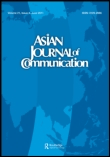
Asian Journal of Communication
Scope & Guideline
Connecting Ideas, Cultures, and Disciplines
Introduction
Aims and Scopes
- Intercultural Communication:
The journal emphasizes the study of communication across different cultures within Asia, examining how cultural nuances influence communication practices, media consumption, and intergroup relations. - Digital Media and Social Platforms:
There is a strong focus on the impact of digital media and social platforms on societal behavior, including issues like online activism, misinformation, and the role of social media in shaping public opinion. - Political Communication:
Research often explores the intersection of media and politics, analyzing how media narratives influence political engagement, public perception, and the dynamics of political discourse in various Asian societies. - Media and Identity:
The journal delves into how media representations shape individual and collective identities, particularly in the context of gender, ethnicity, and religion, reflecting the complexities of identity formation in contemporary Asia. - Crisis Communication:
The journal investigates communication strategies during crises, including public health emergencies and natural disasters, highlighting the role of media in shaping public response and governmental accountability. - Islamic Communication:
A distinctive area of focus includes the exploration of Islamic communication practices, particularly in Southeast Asia, examining how religious values influence media and communication strategies.
Trending and Emerging
- Social Media Activism:
There is a growing trend of research examining how social media platforms facilitate activism, particularly in the context of anti-racism and political participation, reflecting a heightened awareness of social justice issues. - Impact of AI and Algorithms:
The influence of artificial intelligence and algorithms on media consumption and public discourse is increasingly being studied, particularly regarding issues like bias, misinformation, and the creation of echo chambers. - Health Communication:
Research focusing on health communication, especially in the context of the COVID-19 pandemic, has surged, highlighting how media shapes public understanding and response to health crises. - Cultural Representation and Identity Politics:
Emerging studies are increasingly addressing how cultural representations in media affect identity politics, particularly concerning marginalized communities and religious minorities across Asia. - Environmental Communication:
With the growing urgency of climate change, there is an increasing focus on environmental communication strategies and how media narratives shape public perception and engagement with environmental issues. - Transnational Media Flows:
Research is increasingly exploring the implications of transnational media flows, particularly in relation to the Korean Wave and its impact on regional cultural consumption and identity.
Declining or Waning
- Traditional Media Studies:
Research on traditional media forms, such as print and broadcast journalism, has seen a decline as scholars increasingly focus on digital platforms and their transformative effects on communication practices. - Western-centric Communication Theories:
There has been a noticeable shift away from applying predominantly Western communication theories to Asian contexts, with a growing emphasis on developing indigenous theories that better reflect the unique cultural dynamics of the region. - Cultural Homogenization:
Discussions around cultural homogenization and its effects on local cultures have diminished, as the focus has shifted towards celebrating cultural diversity and the resilience of local identities in the face of globalization. - Media Economics:
The exploration of media economics and industry practices has waned, with less emphasis on traditional economic models and more focus on socio-cultural impacts of media consumption. - Media Literacy Initiatives:
While still relevant, the volume of research specifically addressing media literacy initiatives has decreased, potentially due to the increasing assumption of digital literacy among new generations.
Similar Journals
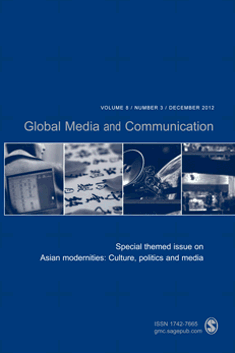
Global Media and Communication
Navigating the Future of Global Communication StrategiesGlobal Media and Communication is a premier journal dedicated to advancing the fields of media and communication studies, published by SAGE Publications Ltd. With an ISSN of 1742-7665 and an E-ISSN of 1742-7673, this journal offers a platform for scholarly discourse and innovative research that explores the intricate relationships between global media practices and communication strategies. Recognized as a Q1 journal in both the Arts and Humanities (Miscellaneous) and Communication categories for 2023, it stands out in its commitment to delivering high-quality, peer-reviewed articles that contribute to the understanding of contemporary media landscapes. Located in London, United Kingdom, the journal benefits from being at the heart of cultural and digital innovation. Researchers, professionals, and students can look forward to insightful articles that not only critique existing frameworks but also propose new methodologies, ensuring that Global Media and Communication remains a vital resource for anyone interested in navigating the evolving dynamics of media and communication on a global scale.
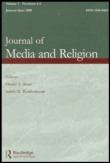
Journal of Media and Religion
Illuminating the Dialogue Between Belief and BroadcastThe Journal of Media and Religion is a leading interdisciplinary journal dedicated to exploring the complex interactions between media and religion. Published by Routledge Journals, Taylor & Francis Ltd, this journal serves as a critical platform for researchers and practitioners within the fields of communication and religious studies. With an impressive impact factor and a distinguished ranking—placing it in the top quartile for Religious Studies and the second quartile for Communication—Journal of Media and Religion showcases high-quality research that enhances our understanding of how media influences religious practices and vice versa. The journal has been converging insightful contributions from 2010 to 2024, fostering scholarly dialogue and innovative methodologies. As an essential resource for academics, professionals, and students alike, it promotes open access to groundbreaking studies, facilitating the exchange of ideas that shape both fields.
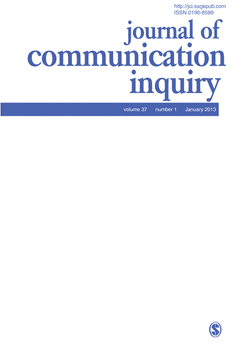
Journal of Communication Inquiry
Illuminating Contemporary Issues in Communication and the ArtsJournal of Communication Inquiry, published by SAGE PUBLICATIONS INC, is a premier interdisciplinary journal that serves as a vital platform for scholars and practitioners in the fields of communication, cultural studies, and the arts and humanities. With a rich history dating back to its inception in 1974, the journal has consistently upheld rigorous academic standards, reflected in its impressive rankings within the Q1 and Q2 quartiles across various disciplines according to the latest metrics. The journal's comprehensive scope encompasses theoretical and empirical research, catering to a diverse readership who are keen to explore contemporary communication issues and cultural dynamics. While the impact factor is not explicitly stated, the journal's Scopus ranks position it favorably within its categories, with notable percentiles that highlight its influence in the academic community. As an essential resource for researchers, professionals, and students alike, the Journal of Communication Inquiry invites contributions that advance the discourse surrounding communication practices and cultural phenomena, contributing to the ongoing dialogue in these evolving fields.

Revista de Comunicacion-Peru
Advancing Knowledge in Communication and Media Analysis.Revista de Comunicación-Perú is a distinguished open-access journal published by Universidad de Piura, with a dedicated focus on communication studies. Since its inception in 2002, the journal has provided a vital platform for researchers, professionals, and students to disseminate knowledge and foster discourse in the field of communication. As of 2023, it proudly holds a Q1 classification in the Communication category and ranks impressively in Scopus, placing at #117 out of 1304 in Cultural Studies and #160 out of 511 in Communication, demonstrating its significant impact within the academic community. The journal’s scope encompasses diverse topics related to communication, cultural discourse, and media analysis, making it an essential resource for those seeking to explore contemporary issues in these areas. With a commitment to promoting scholarly exchange, Revista de Comunicación-Perú continues to play a pivotal role in shaping the communication landscape in Peru and beyond.

Comunicacio-Revista de Recerca i d Analisi
Connecting Ideas, Cultures, and DisciplinesComunicacio-Revista de Recerca i d Analisi, published by SOC CATALANA COMUNICACIO, serves as a leading platform in the field of communication studies, focusing on innovative research and critical analysis. With its Open Access policy established in 2010, the journal ensures that quality research is accessible to a broader audience, promoting the dissemination of knowledge in the realm of communication. The journal, which is characterized by its rigorous peer-review process, aims to explore various dimensions of communication, media, and cultural studies, thereby facilitating an interdisciplinary dialogue among researchers, professionals, and students. Housed in the vibrant city of Barcelona, Spain, this journal is poised to make a substantial impact in the academic community, offering a valuable resource for those seeking to stay abreast of the latest developments in the field.
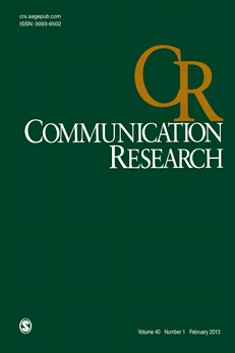
COMMUNICATION RESEARCH
Navigating the Complexities of Human Communication.COMMUNICATION RESEARCH, published by SAGE Publications Inc, stands as a premier journal in the fields of Communication and Linguistics, boasting an impressive impact factor that reflects its influential contributions to academic scholarship. Since its inception in 1974, this esteemed journal has provided rigorous, peer-reviewed research that delves into the dynamics of human communication, making it a vital resource for researchers, practitioners, and students alike. With a commendable ranking within the Q1 category for both Communication and Linguistics and consistently placed within the 99th percentile across Scopus ranks, COMMUNICATION RESEARCH is at the forefront of academic inquiry, fostering a deeper understanding of communication processes in diverse contexts. While not an Open Access journal, it offers extensive access options facilitating widespread dissemination of knowledge. Researchers can look forward to an engaging array of cutting-edge studies and theoretical advancements in forthcoming issues, making it an indispensable tool for those studying the complexities of language and communication.
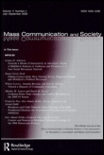
Mass Communication and Society
Advancing Insights into Mass Communication DynamicsMass Communication and Society is an esteemed journal published by Routledge Journals, Taylor & Francis Ltd, focusing on the dynamic field of communication studies. With its ISSN 1520-5436 and E-ISSN 1532-7825, the journal has established itself as a leading platform for high-quality research since its inception. With a prestigious positioning in the Q1 category of Communication as of 2023, it ranks impressively at #45 out of 511 in Scopus within the social sciences communication sector, boasting a 91st percentile in its field. The journal serves as a vital resource for researchers, professionals, and students interested in emergent issues, theories, and methodologies related to mass communication and its impact on society. Although it does not offer Open Access options, the journal remains committed to advancing scholarly discourse and providing rigorous insights into how communication shapes social dynamics. Since its converged years from 2008 to 2024, Mass Communication and Society continues to push the boundaries of knowledge in a rapidly evolving academic landscape, making it a must-read for anyone invested in the communication discipline.

Historia y Comunicacion Social
Unlocking Insights at the Crossroads of History and Communication.Historia y Comunicación Social is a distinguished academic journal published by UNIVERSIDAD COMPLUTENSE MADRID, SERVICIO PUBLICACIONES, dedicated to the interdisciplinary exploration of history and communication. With a notable impact factor reflected in its impressive rankings across various categories—Q1 in History and Q2 in Communication and Sociology/Political Science—this journal stands out as a critical resource for scholars and practitioners alike. Established as an Open Access platform since 1996, it has broadened accessibility to research, fostering innovative discussions and insights from the historical and communicative realms. Spanning from 2010 to 2024, the journal encourages contributions that challenge conventional narratives and offer fresh perspectives. With its significant recognition in Scopus rankings, inclusive of a remarkable 88th percentile in Arts and Humanities History, Historia y Comunicación Social serves as a vital hub for those seeking to deepen their understanding of the complex interplay between history and communication.

Media International Australia
Advancing Scholarly Dialogue in Media StudiesMedia International Australia is a leading journal that occupies a unique position at the intersection of communication and cultural studies. Published by SAGE Publications Ltd, this journal has established itself as a vital platform for scholarly discourse since its inception, now converging efforts from 2008 to 2024. With an impressive Q1 ranking in both the Communication and Cultural Studies categories, it ranks 12th out of 1304 in Cultural Studies and 42nd out of 511 in Communication, placing it within the 99th and 91st percentiles respectively according to Scopus metrics. The journal is committed to providing access to rigorous research that reflects contemporary issues in media, making it essential reading for researchers, professionals, and students keen on advancing their understanding of media's role in society. Despite not being fully Open Access, it ensures that quality research remains accessible through institutional subscriptions, allowing a broad audience to benefit from its insightful contributions.

Frontiers in Communication
Fostering Interdisciplinary Insights in CommunicationFrontiers in Communication is a prestigious open-access journal published by FRONTIERS MEDIA SA, dedicated to advancing the field of communication studies. Established in 2016 and situated in Switzerland, this journal has quickly ascended to notable ranks, achieving a Q1 category in both Communication and Social Sciences (miscellaneous) as of 2023. With an impressive Scopus rank, positioning it in the 75th and 78th percentiles for its respective categories, Frontiers in Communication serves as a vital platform for innovative research, interdisciplinary dialogue, and the dissemination of knowledge in the rapidly evolving landscape of communication. The journal emphasizes accessibility and intellectual exchange, providing an open-access format that ensures unrestricted access for researchers, professionals, and students alike. By fostering collaboration and exploration across various communication frameworks, Frontiers in Communication plays a crucial role in shaping the future discourse within the field.